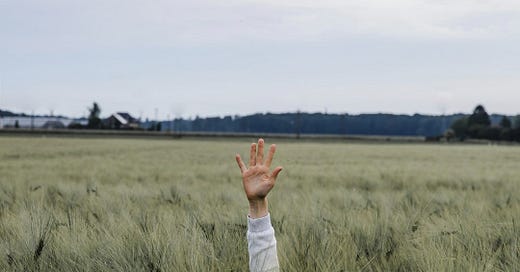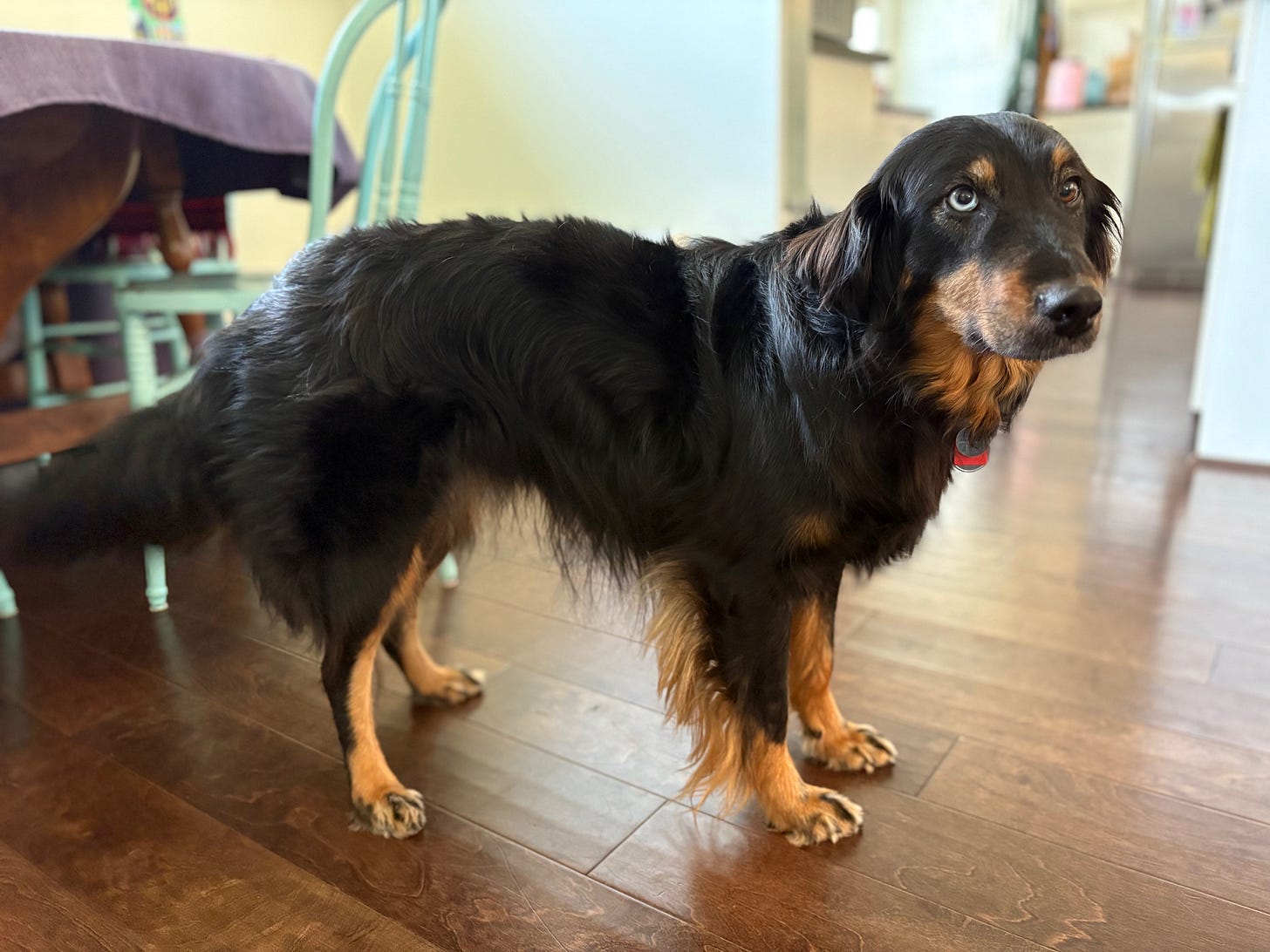Here at Dog Lover’s Guide, we’re big believers in hijacking your brain: using psychological concepts to trick your brain into having fun when completing unfun tasks. So let me introduce today’s crow bars: the primacy and recency effects.
If I tell you to remember five numbers and then distract you for 20 minutes with pictures of my dog, you’re most likely to remember the first and last number you heard. Why? Because our brains best remember the first thing we heard (the primacy effect) and the last thing we heard (the recency effect).
As it turns out, the primacy and recency effects aren’t just useful for remembering numbers. They’re also pretty handy for completing difficult or overwhelming tasks. How, you may ask? Well, let me tell you about my most difficult training experience with Pants: teaching her to stand.
I decided to teach Pants to stand up on command because it’s a super helpful during grooming sessions and vet examinations. I thought it would be a breeze; most of the time, my little rescue rover is a training whiz. She learned how to back up in a day. Sticking out her tongue when I stuck mine out at her – 30 minutes. But stand? Something she does every single day, several times a day, with nary a treat?
Nope.
It was maddening.
I tried so many different methods of getting her butt in the air and all four feet on the ground, from luring her towards me to nudging her up with my foot to capturing the behavior when it happened. But nothing I did connected the command, “Stand!” with her standing up. She just couldn’t get it.
About half an hour into a training session, I would yell, “This is not hard!” (despite all the evidence that it was, in fact, very hard), and throw the treat bag down.
“Maybe you should take a break,” my wife would suggest gently.
“Fine.” It was not fine.
The next evening when it was time to train Pants, all I felt was dread. I didn’t want to do it anymore. Before long, I abandoned the project.
Hijack Your Brain
Let’s look back at those two effects: primacy and recency. What we remember best is the first and last parts of an experience.
If I’m dreading training Pants, then I have a good time for ten minutes, and then things go south and I feel frustrated and quit, what am I going to remember?
Primacy: dread
Recency: frustration
The next time I train Pants, dread and frustration are going to be the first things that come up. Again, I may have a good time for a little while, but if I run the session too long, I’ll get frustrated, overwhelmed, or tired, and that’s what I’ll take away from it. Eventually, as you saw above, I’ll abandon the project because all my brain is taking away from the exercise is suffering.
Chores: The Bringer of Dread
Remember the last time you felt so overwhelmed by a chore that you couldn’t begin? Maybe it was a pile of laundry, decluttering, or applying for jobs. For Jesse, it’s yard maintenance. Jesse fell behind on managing the weeds, and now the city is saying they’re going to get fined if they don’t clean it up. But every time Jesse thinks about the work, they feel too overwhelmed to start.
Then one day, Jesse wakes up in a good place. I’m going to tackle that yard, they think. They put on their gardening gloves and get to work. They’re so into it that they skip lunch and water breaks. By evening, the yard is three-quarters done, and Jesse is past exhausted. They just can’t finish the job.

Have you ever been here, starting a task you dreaded and burning yourself out before you finish it? Do you ever come back to wrap it up? Jesse didn’t. The next day they were so sore and dehydrated that they didn’t even get out of bed, then the following day it rained, and after that every time they thought of it, they felt overwhelmed and helpless, recalling how hard they worked, and how they failed anyway. In terms of primacy and recency, here’s what they remembered:
Primacy: dread, overwhelm
Recency: pain, exhaustion, ineffectiveness
The yard never got finished.
So What’s a Dog to Do?
What if I stopped training Pants while we were still having fun? It’s not usually the time we want to stop something; in fact, it’s when we’re most likely to want to keep going. So why stop here?
To hijack the recency effect.
Let’s say Pants and I tended to do our best work at minute seven. If I stopped there, the last things I would think and feel about the training session would be:
This is fun
We’re good at this
I want to keep going
I would probably feel frustrated at the idea of stopping because those things feel so good, and I would be itching to get back to training as soon as I could.
Which is exactly what I’m going for. I’ve hijacked the recency effect.
On to the primacy effect!
This one is a wash the first time you try this technique. On day one, Jesse has no choice but to fight through the dread to start the work. But if they limit their work to an hour and stop when they feel good about what they’re accomplishing, they’ll walk away with a primacy and recency that looks like this:
Primacy: dread and overwhelm
Recency: I got this, this is actually kind of enjoyable, and I am capable
On day two, they’ll hit the yard with a little more verve, because they remember how good they felt at the end of day one (recency). And what do you know? On day three when they think about the yard, they’ll remember how good they felt at the beginning of day two’s work session as well as the end. Now their primacy and recency look like this:
Primacy: excitement
Recency: effectiveness
They have mastered the primacy and recency effect. Every time they do this, it will get easier, they’ll feel more capable and motivated, and at some point in the future, the job will be done.
We’re not subject to the whims of primacy and recency. We can make them work for us. Here’s how:
Choose the task you’re going to tackle.
Think about how long it takes for you to start feeling overwhelmed and burned out. Cut that time in half. This is your activity time.
Before starting the activity, take a breath and notice how you feel. This is your primacy.
Start a timer and begin the activity.
When the timer goes off, stop no matter where you are in the activity.
Take a breath and notice how you feel. This is your recency. If you feel overwhelmed and burned out, cut the activity time in half again. It’s okay if your activity time is just 60 seconds. The goal is not to complete the activity – it’s to hijack the primacy and recency effect.
Start at step 3 tomorrow, with the new time if necessary. Keep adjusting until you start feeling annoyed at the timer for going off, because you’d really just like to keep going.
Continue steps 3 through 7 until the task is done. Experiment with adding more time.
Pants is sort of okay at standing on command now, and it turns out it isn’t as necessary as I made it out to be. The most important thing is that I learned to quit while we were still having fun, both for my own well-being, and for Pants’ sake. These days when we train, I follow the rules of the primacy and recency effect, and we have a good time.
What tricks did you and your dog struggle with? How are you going to hijack your primacy and recency effect? Leave a comment below!







Okay, I’m going to try this. There are a few chores waiting for me that I dread. The Chihuahuas seem to have mastered the technique already in their training of me.
Excellent plan. I'm definitely going to try this.